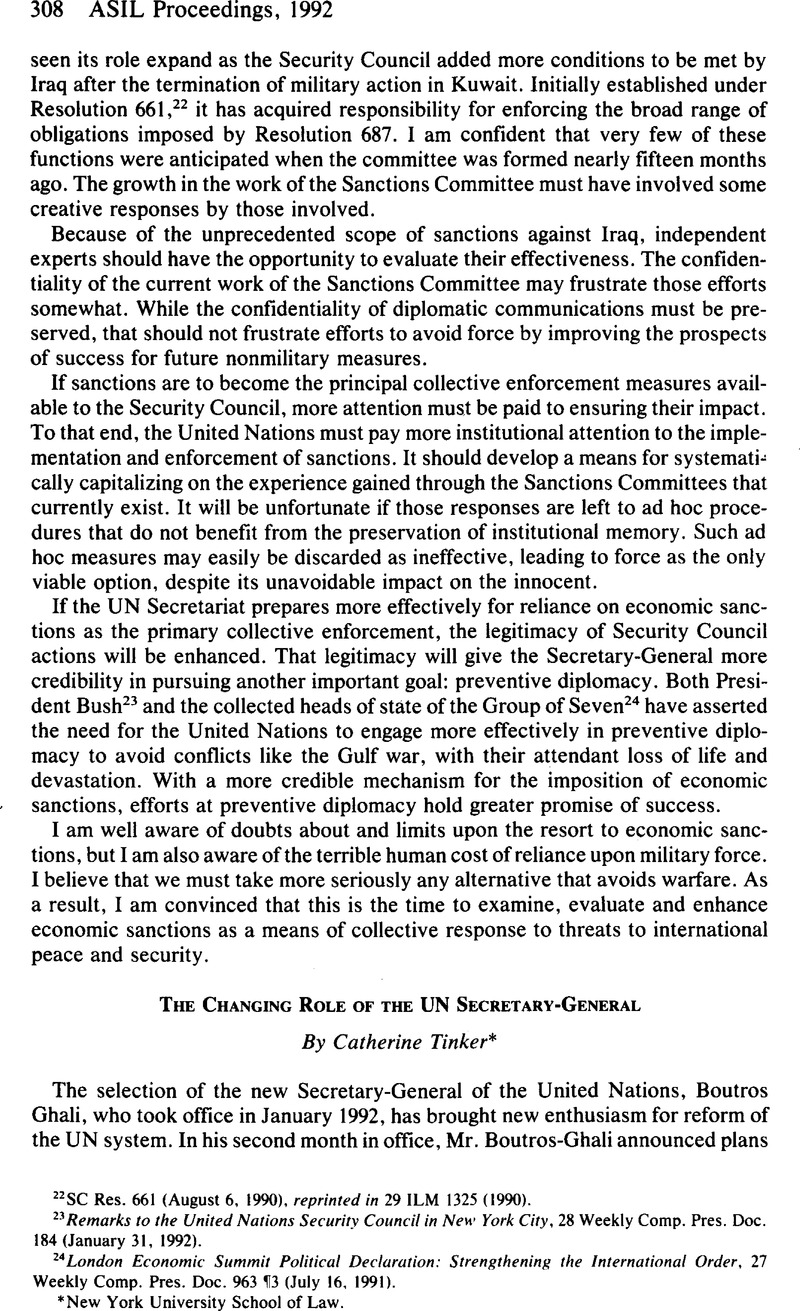No CrossRef data available.
Article contents
The Changing Role of the UN Secretary-General
Published online by Cambridge University Press: 28 February 2017
Abstract

- Type
- The United Nations Response to a Changing World: International Law Implications (Sponsored by the International Organizations Interest Group)
- Information
- Copyright
- Copyright © American Society of International Law 1988
References
1 Hague Academy of International Law, The Adaptation of Structures and Methods at the United Nations (1985).
2 Id. at 87.
3 It took collective security action in the Gulf war and recently voted sanctions against Libya.
4 Under the leadership of Jan Eliasson and now of Juan Somavia, ECOSOC seems finally to be taking up its role in earnest, in the fifth decade of the its existence.
5 Nongovernmental organizations should be renamed to reflect a more positive view of their role in the UN system, as that role becomes more clearly recognized and defined. Perhaps they should be called “representative civil societies” or “citizen associations.”
6 Libya took the question of treaty interpretation to the ICJ related to the U.S./UK/French extradition request for the accused terrorists involved in the Lockerbie bombing of Pan Am flight 103. The United States, the United Kingdom and France, however, took Libya’s failure to comply with their extradition request to the Security Council as a political matter and potential threat to international peace and security.
7 Minutes of an August 17, 1945, meeting at the U.S. Department of State, prior to the meeting of the Preparatory Commission in London (National Archives, Washington, D.C.).
8 See Brian Urquhart and Erskine Childers, A World in Need of Leadership: Tomorrows United Nations (1990).
9 This area was the focus of reorganization efforts in 1990-1991 by a group of nations informally led by Ambassador Peter Wilenski, then Permanent Representative of Australia to the United Nations. Recommendations to the new SG include streamlining of operations and rationalization of the duplicative tasks of various parts of the system. Crucial to success in this area is the ability of the SG to delegate responsibility in operational areas.
10 James Sutterlin, The U.N. Secretary-General as Chief Administrator, presented at the Ralph Bunche Institute on the UN System, September 1991, in Benjamin Rivlin & Leon Gordenker (EDS.I. The Challenging Role of the United Nations Secretary-General (forthcoming 1993).
11 Comments at Ralph Bunche Institute conference, id.
12 Minutes of June 17, 1945, meeting of Committee 1/2 of UNCIO. The same committee adopted a draft based on a Venezuelan proposal that the General Assembly should elect a secretary-general from among three candidates nominated by the Security Council, but the idea was ultimately dropped. Cf. Ruth Russell, A History of the United Nations Charter (1958).
13 Cf. the UN peacekeeping missions in Cambodia, Namibia, Yugoslavia, and a possible mission in the Western Sahara, examples of efforts to halt bloodshed in civil wars arising out of failures in nationbuilding or ethnic separations.
14 Supra note 10.


